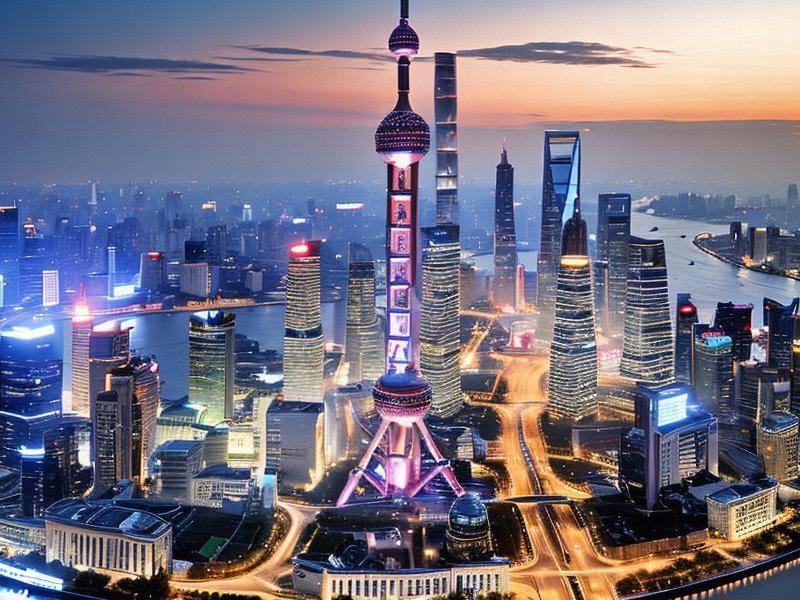
Shanghai, the bustling metropolis on the eastern coast of China, has long been a symbol of the country's economic prowess. Over the past few decades, it has evolved from a manufacturing powerhouse to a global center for finance, trade, and now, innovation. This transformation is not just a testament to Shanghai's adaptability but also a reflection of China's broader ambitions to lead in the global arena of technological and scientific advancements.
The journey began in the late 20th century when Shanghai started to modernize its infrastructure and attract foreign investment. The establishment of the Pudong New Area in the 1990s marked a significant turning point. Pudong, once a rural area, was transformed into a showcase of modernity with towering skyscrapers, state-of-the-art transportation systems, and a concentration of financial institutions. This area became a beacon for international businesses and a hub for cutting-edge research and development.
One of the key factors behind Shanghai's success in becoming an innovation hub is its commitment to fostering a supportive ecosystem for technology and entrepreneurship. The city has invested heavily in research and development, with numerous universities, research institutes, and technology parks emerging across the city. Institutions like Fudan University and Tongji University have played a pivotal role in producing a highly skilled workforce that is essential for innovation.
Shanghai's government has also been proactive in creating policies that encourage innovation. The introduction of the Shanghai Free-Trade Zone in 2013 was a landmark move that aimed to streamline customs procedures, reduce trade barriers, and attract foreign investment. This initiative has not only boosted international trade but also created an environment conducive to the growth of innovative businesses.
上海龙凤论坛爱宝贝419 The city's focus on high-tech industries has been another driving force behind its transformation. Shanghai has become a leader in sectors such as artificial intelligence (AI), biotechnology, and information technology. Companies like Alibaba, Tencent, and Huawei have established their presence in the city, leveraging its infrastructure and talent pool to develop and commercialize new technologies.
One of the most notable examples of Shanghai's technological advancements is the city's smart infrastructure. Smart transportation systems, such as the magnetic levitation (maglev) train and the extensive metro network, have made commuting efficient and convenient. The city is also at the forefront of smart city initiatives, using data and technology to improve urban living. Smart streetlights, waste management systems, and public safety measures are just a few examples of how Shanghai is integrating technology into everyday life.
In addition to technological innovation, Shanghai has also made significant strides in cultural and creative industries. The city's vibrant arts scene, with its numerous galleries, theaters, and music venues, attracts artists and creatives from around the world. The Shanghai International Film Festival, one of the oldest and most prestigious film festivals in Asia, is a testament to the city's commitment to fostering a dynamic cultural environment.
The transformation of Shanghai into a global innovation hub has not been without challenges. The rapid pace of urbanization has led to issues such as housing shortages, traffic congestion, and environmental concerns. However, the city has been addressing these challenges through sustainable development strategies. Initiatives like the construction of green buildings, the promotion of electric vehicles, and the expansion of public green spaces are aimed at creating a more livable and sustainable city.
上海花千坊爱上海 Shanghai's aspirations to be a global leader are also reflected in its participation in international collaborations and initiatives. The city has become a member of organizations such as the Global Cities Initiative and the World Economic Forum, which provide platforms for dialogue and cooperation among cities worldwide. Shanghai's active involvement in these initiatives underscores its commitment to sharing knowledge and best practices with other cities facing similar challenges and opportunities.
The future of Shanghai as a global innovation hub looks promising. The city is poised to benefit from China's ongoing efforts to deepen reforms and open up its economy further. The Belt and Road Initiative, a massive infrastructure project connecting Asia, Africa, and Europe, presents significant opportunities for Shanghai to enhance its role as a global trade and logistics center.
Moreover, the city's focus on nurturing talent and fostering innovation will continue to drive its growth. Shanghai's ability to attract and retain top talent, both domestically and internationally, will be crucial in maintaining its competitive edge. The city's emphasis on education, research, and entrepreneurship ensures that it remains at the forefront of technological advancements.
上海龙凤阿拉后花园 In conclusion, Shanghai's journey to becoming a global innovation hub is a story of resilience, adaptability, and ambition. From its transformation of Pudong to its leadership in high-tech industries, the city has demonstrated its ability to embrace change and seize opportunities. As Shanghai continues to evolve, it serves as a model for other cities aspiring to achieve similar success.
The challenges that lie ahead are significant, but with its robust infrastructure, supportive policies, and innovative spirit, Shanghai is well-equipped to navigate the complexities of the modern world. The city's vision for the future is clear: to be a global leader in innovation, sustainability, and cultural exchange.
As we look ahead, it is evident that Shanghai's story is far from over. The city's journey is a testament to the power of human ingenuity and determination. In the years to come, Shanghai will undoubtedly continue to inspire and captivate the world with its achievements and aspirations.
